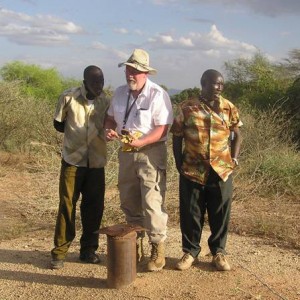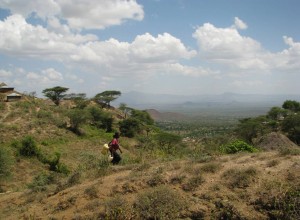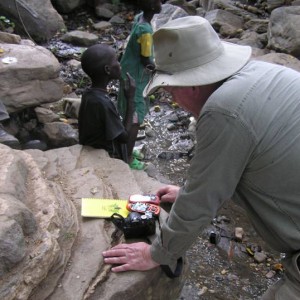Dr. Bruce Darling will speak Friday, April 15, at ACC’s Northridge Campus (11928 Stonehollow Dr., Building 4000 auditorium). His presentation begins at 7 p.m. and will cover his experiences in Kenya. The community is welcome to attend.
The objects are a reminder of his recent trip to Africa, where he scouted safe, sustainable water sources for villagers in rural Kenya.
“What we found was eye-opening,” says Darling, who made the trip in January with the group Hydrogeologists Without Borders. “Water-borne illness is a pervasive problem in many parts of Africa, and people have to go to great lengths to get water.”
Darling teaches Physical Geology (GEOL 1403) and has spent years working on water development throughout Texas, volunteering his time to help small communities manage their water resources. He always wanted to take his expertise to areas of the world most in need, so Darling quickly accepted the opportunity to serve as technical director for the Kenya project.
“We spent two weeks taking cold showers and eating goat, but that’s nothing compared to what these people go through on a daily basis,” says Darling. “It’s a much harder life than many could imagine – no plumbing and no electricity. Our objective was to make life a bit easier by giving them access to clean water.”
It’s not uncommon for people in the Marakwet District to walk nearly five miles a day to and from springs and old canals that are contaminated.
The project’s initial aim was to assess the potential for installing wells, but the lack of widespread electricity makes that a challenge.
“We quickly realized the many springs that flow year-round along the Rift Valley are potentially reliable sources of water,” he recalls. “We just need to make that water safe and convenient.”
Darling and his colleagues proposed to catalog the locations of the springs and determine which are most consistent. The goal is to install spring water collection systems to prevent contamination and transport the water through pipes to storage tanks in the villages. They also plan a public education campaign to make people more aware of how to ensure water is clean.
“This will eliminate much of the potential for illness and death caused by consumption of contaminated water,” notes Darling. “In addition, the spring water collection systems will keep the people – typically women – from walking miles each day to get water, giving them more opportunities to attend to their families and communities. There is a definite link between water and economic development, so this will truly change lives.”
The trip proved life-changing for Darling, too.
“The experience gave me an even greater appreciation for the things we have,” he reflects. “Even though I’ve worked in this field for years, the trip certainly made me even more aware of the acute need to do something to ensure people have access to clean water.”
Darling will return to Kenya this summer to map additional springs and supervise their development.
“The people of the Marakwet District were very supportive and receptive, and they look forward to us coming back to continue the work,” he says.
Darling’s experiences bring geology to life in the classroom.
“Many individuals do not see how geology impacts our everyday lives,” says Josh Kennedy, who took Darling’s Physical Geology class last summer. “This helps bring it home in a way people can understand. I always think the best teachers are those who have acquired knowledge through real-life work, not merely academic study.”
Follow these links to learn about ACC’s departments of Geology and Environmental Science and Technology, where specialized water resource management courses are taught.
Back to Top




By Christa Reid February 15, 2011 - 11:28 pm
Dr. Darling is an amazing professor, I took his class last spring and I learned so much about how geology is all around us and effecting our lives everyday. I am not surprised he has made such an impression on the people in Kenya, he has the ability to teach through doing, not just teaching, it’s hands on learning.
Thanks Dr.Darling!
By Lisa Haynes February 17, 2011 - 9:46 am
As a fellow adjunct professor, I am inspired and in awe of Dr. Darling and what he is doing for the people of Kenya. How lucky are we to have such an interesting instructor to learn from and to represent our school.
By Sierra Treanor March 7, 2011 - 10:36 am
I admire his efforts and hope we ACC students continue to change the world around us. It would be nice to have a geology club to further involve students.
By Mr Homes For Sale Elk Grove CA March 13, 2011 - 1:02 pm
this is incredible.
By maggie bryant March 18, 2011 - 9:18 am
two classes i would like to see added to the science programs: hydrology and paleontology! we have excellent geologists at acc; let’s benefit from their knowledge.